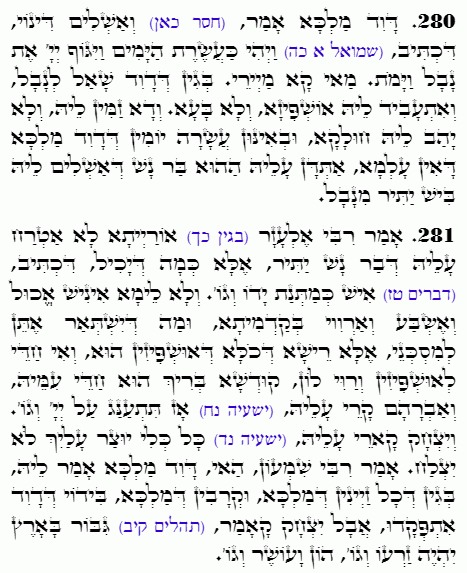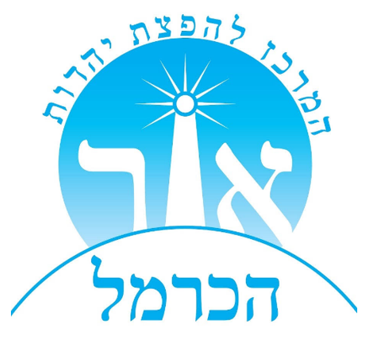Daily Zohar # 4563 – Emor – Nabal or generosity
Daily Zohar 4563

Hebrew translation:
281. אָמַר רַבִּי אֶלְעָזָר, (מִשּׁוּם כָּךְ) אֵין הַתּוֹרָה מַטְרִיחָה עַל אָדָם יוֹתֵר, אֶלָּא כְּמוֹ שֶׁהוּא יָכוֹל, שֶׁכָּתוּב (דברים טז) אִישׁ כְּמַתְּנַת יָדוֹ וְגוֹ’. וְלֹא יֹאמַר אָדָם אֹכַל וְאֶשְׂבַּע וְאֶשְׁתֶּה בָּרִאשׁוֹנָה, וּמַה שֶּׁיִּשָּׁאֵר אֶתֵּן לָעֲנִיִּים. אֶלָּא רֵאשִׁית הַכֹּל הוּא שֶׁל הָאוֹרְחִים. וְאִם שִׂמַּח אֶת הָאוֹרְחִים וְהִשְׁקָה אוֹתָם, הַקָּדוֹשׁ בָּרוּךְ הוּא שָׂמֵחַ עִמּוֹ, וְאַבְרָהָם קוֹרֵא עָלָיו, (ישעיה נח) אָז תִּתְעַנַּג עַל ה’ וְגוֹ’. וְיִצְחָק קוֹרֵא עָלָיו, (שם נד) כָּל כְּלִי יוּצַר עָלַיִךְ לֹא יִצְלָח. אָמַר רַבִּי שִׁמְעוֹן, אֶת זֶה דָּוִד הַמֶּלֶךְ אָמַר אוֹתוֹ, מִשּׁוּם שֶׁכָּל כְּלֵי הַזַּיִן שֶׁל הַמֶּלֶךְ וְהַקְּרָבוֹת שֶׁל הַמֶּלֶךְ נִפְקְדוּ בְּיַד דָּוִד. אֲבָל יִצְחָק אָמַר, (תהלים קב) גִּבּוֹר בָּאָרֶץ יִהְיֶה זַרְעוֹ וְגוֹ’, הוֹן וָעֹשֶׁר וְגוֹ’.
.
Zohar Emor
Continued from previous DZ
#280
King David said, concluding his judgments, as it is written,
1 Samuel 25:38
“וַיְהִי כַּעֲשֶׂרֶת הַיָּמִים וַיִּגֹּף יְהוָה אֶת נָבָל וַיָּמֹת”
“Then it happened, after about ten days, that YHVH struck Nabal, and he died.”
What does this mean? It is because David asked Nabal to receive him as a guest, and Nabal refused. Similarly, if one who dwells in the sukkah invites King David, representing Malchut, and does not give him his portion, King David invokes this verse about Nabal against him. During those ten days, when King David, who is Malchut, judges the world—specifically during the “עשרת ימי תשובה” Ten Days of Repentance—that person is judged more harshly than Nabal. Because he invited him and did not give him his portion, it would have been better if he had not invited him.
#281
Rabbi Elazar explains that the Torah does not burden a person beyond their capacity to give, as it is written,
Deuteronomy 16:17
“אִישׁ כְּמַתְּנַת יָדוֹ כְּבִרְכַּת יְהוָה אֱלֹהֶיךָ אֲשֶׁר נָתַן לָךְ.”
“Every man shall give as he is able, according to the blessing of YHVH, your God, which He has given you.”
A person should not say, “I will eat and be satisfied, and what is left, I will give to the poor.” Instead, the first portion should belong to the guests. If one generously delights his guests and provides for them, the Holy One, Blessed be He, rejoices with him. Abraham would then proclaim over him,
Isaiah 58:14
“אָז תִּתְעַנַּג עַל יְהוָה וְהִרְכַּבְתִּיךָ עַל בָּמֳתֵי אָרֶץ וְהַאֲכַלְתִּיךָ נַחֲלַת יַעֲקֹב אָבִיךָ כִּי פִּי יְהוָה דִּבֵּר.”
“Then you shall delight in the Lord,” and Isaac declares, “No weapon formed against you shall prosper.”
And Isaac say “כָּל כְּלִי יוּצַר עָלַיִךְ לֹא יִצְלָח ” “No weapon formed against you shall prosper, ” (Isaiah 54:17)
Rabbi Shimon adds that this verse is related by King David, who represents Malchut, because all the king’s instruments and the king’s wars are delivered into the hands of David. However, Isaac says,
Psalm 112:2,3
“גִּבּוֹר בָּאָרֶץ יִהְיֶה זַרְעוֹ דּוֹר יְשָׁרִים יְבֹרָךְ.”
“הוֹן וָעֹשֶׁר בְּבֵיתוֹ וְצִדְקָתוֹ עֹמֶדֶת לָעַד.”
“His descendants will be mighty on earth; The generation of the upright will be blessed.”
“Wealth and riches will be in his house, And his righteousness endures forever.”
Lesson:
This Zohar teaching emphasizes the profound spiritual rewards of generosity and hospitality. Prioritizing guests’ needs, especially during celebration and holidays, aligns one with joy and protection from above. It also reflects the connection of physical kindness with spiritual abundance and security. The joy of fulfilling a mitzvah brings material and spiritual blessings, illustrating a core principle in the Torah laws about the cause and effect of Hashem’s blessings through acts of generosity.
Friday would be a good day to make a ** Donation, especially if you didn’t donate in the past week. Giving on Friday, which is an aspect of Yessod, expands the vessel for the Light and honor of Shabbat.
** Your donation doesn’t have to be given to the same place every week. You can alternate or split your donation among those who benefit you spiritually.
 Support – Ohr HaCarmel Yeshiva
Support – Ohr HaCarmel Yeshiva
Tap here: Ohr HaCarmel Donation Page to make your contribution and make a spiritual connection to Israel.
The Yeshiva Ohr HaCarmel (which means the Light of the Carmel) is on top of Mount Carmel, where the prophet Elijah’s prayers were answered.

 Previous: Emor
Previous: Emor
